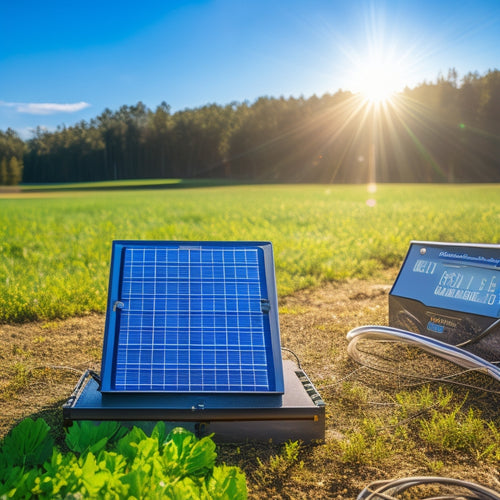
Cost of Solar Panel Battery Storage
Share
As you consider investing in solar panel battery storage, you'll need to factor in the cost, which typically ranges from $5,000 to $15,000 or more, depending on the capacity and quality of the system, as well as the installation process. These systems can save you money on electricity bills, reduce your carbon footprint, and provide a reliable backup power source. Deep cycle batteries, which are ideal for off-grid applications and home energy storage systems, offer longer cycle life and improved depth of discharge. To guarantee a seamless integration, it's essential to check your inverter compatibility, and manufacturers often provide a longer lifespan guarantee. Exploring these factors will help you make an informed decision about your solar panel battery storage investment.
The Essentials
- Installation of solar panel battery storage lowers electricity bills by storing excess energy for peak hours and reducing reliance on the grid.
- Long-term savings and financial incentives like tax credits can offset the initial cost of solar battery systems, making them more affordable.
- The cost of solar panel battery storage systems varies depending on factors such as battery type, capacity, and inverter compatibility.
- Deep cycle batteries provide longer cycle life and improved depth of discharge, reducing the frequency of battery replacements and enhancing reliability.
- Financial incentives and lower electricity bills can lead to a potential return on investment within 5-7 years, making solar panel battery storage a cost-effective option.
Save Money on Electricity
By installing solar panel battery storage, you'll be able to lower your electricity bill by storing excess energy generated during the day for use during peak hours or at night.
This means you'll reduce your reliance on the grid and avoid paying premium rates for electricity.
With a battery storage system, you'll also gain protection from grid outages and fluctuations and have more control over your energy bills.
Additionally, you'll reduce energy waste by utilizing energy that would otherwise be lost, further optimizing your energy consumption.
Lower Your Bill
Your electricity meter is constantly ticking away, racking up charges that can be a significant drain on your wallet.
However, with solar panel battery storage, you can take control of your energy costs and lower your bill. By generating your own clean energy, you can reduce your reliance on the grid and cut down on your electricity expenses.
With a high-quality house solar battery, you can store excess energy generated by your solar panels and use it during off-peak hours or emergencies, allowing you to optimize your energy consumption and reduce your grid dependence.
A cost analysis will show you that investing in solar panel battery storage can pay off in the long run. Not only will you save money on your electricity bill, but you'll also benefit from financial incentives like tax credits and rebates.
These incentives can help offset the initial cost of the system, making it a more affordable option.
Reduce Energy Waste
Relying on the grid can lead to energy waste, as excess energy generated during the day is often lost when it's not used immediately. This is because the grid can't store energy, so any excess is wasted.
With a solar panel battery storage system, you can reduce this waste and increase your energy efficiency. When your solar panels generate more energy than you're using, the excess is stored in your battery for later use. This means you can use that stored energy at night or during power outages, reducing your reliance on the grid.
By incorporating high-efficiency battery systems and advanced lithium-ion batteries into your solar panel system, you can maximize your energy storage capacity and minimize waste. By storing excess energy, you're reducing waste and making the most of the energy you generate.
This not only saves you money on your electricity bill but also increases your energy independence. By reducing your energy waste, you're taking a significant step towards energy self-sufficiency.
With a solar panel battery storage system, you can optimize your energy usage and minimize waste, giving you more control over your energy needs.
Reduced Carbon Footprint Guarantee
You're likely looking for a solar panel battery storage system that not only saves you money on electricity but also aligns with your eco-friendly values.
By investing in solar energy, you'll greatly reduce your reliance on fossil fuels, resulting in a lower carbon footprint.
With the ability to utilize renewable energy from photovoltaic cells and green energy systems, you can feel confident in your decision.
Additionally, residential solar power systems can be connected to the electrical grid, providing a reliable source of energy.
With a reduced carbon footprint guarantee, you can rest assured that your energy solution is contributing to a cleaner, more sustainable environment.
Eco-Friendly Energy Solutions
As the world shifts towards a more sustainable future, homeowners and businesses are increasingly seeking eco-friendly energy solutions that guarantee a reduced carbon footprint. You're likely no exception, and you're probably interested in exploring options that align with your values and goals.
When it comes to eco-friendly energy solutions, solar energy trends are leading the way. With the cost of solar panels decreasing dramatically over the past decade, sustainable technology has become more accessible than ever. By utilizing the power of the sun, you can considerably reduce your reliance on fossil fuels and lower your carbon emissions.
As you consider your options, you'll want to look for solutions that integrate seamlessly with your existing energy infrastructure. This might include battery storage systems that allow you to store excess energy generated during the day for use during the night or on cloudy days.
Low Emission Guarantee
One of the most notable advantages of solar panel battery storage is the Low Emission Guarantee, which guarantees a reduced carbon footprint in your energy consumption.
This guarantee is made possible by the integration of solar technology advancements and energy storage innovations. With solar panel battery storage, you can capture and store clean energy from the sun, reducing your reliance on fossil fuels and lowering your carbon emissions.
The Low Emission Guarantee provides you with a clear understanding of the environmental benefits of your energy solution. By investing in solar panel battery storage, you can notably reduce your carbon footprint, contributing to a cleaner and healthier environment for future generations.
Additionally, this guarantee offers a sense of freedom from the constraints of traditional energy sources, allowing you to take control of your energy consumption and reduce your impact on the environment.
Deep Cycle Battery Benefits
You'll find that deep cycle batteries offer two significant benefits: a longer cycle life and improved depth of discharge.
They're particularly well-suited for off-grid batteries and home energy storage systems, making them a popular choice for those looking for reliable backup power.
A longer cycle life means you'll get more charge and discharge cycles out of your battery, reducing the need for frequent replacements.
With an improved depth of discharge, you can use more of your battery's capacity without damaging the cells, increasing the overall efficiency of your solar panel battery storage system.
Longer Cycle Life
Deep in the heart of a deep cycle battery lies its greatest advantage: a considerably longer cycle life. This means you can expect your deep cycle battery to last for thousands of charge and discharge cycles, providing you with a reliable source of energy for years to come.
| Cycle Life | Cycle Efficiency | Maintenance Requirements |
|---|---|---|
| 3000-5000 cycles | 80-90% | Low, occasional equalization |
| 2000-3000 cycles | 70-80% | Occasional watering, equalization |
| 1000-2000 cycles | 60-70% | Regular watering, equalization |
| 500-1000 cycles | 50-60% | Frequent watering, equalization |
| Less than 500 cycles | Less than 50% | High, frequent maintenance |
With a longer cycle life, you can expect higher cycle efficiency, reducing the overall cost of ownership. Additionally, the lower maintenance requirements of deep cycle batteries mean you'll spend less time and money on upkeep, giving you more freedom to enjoy the benefits of your solar panel battery storage system.
Improved Depth Discharge
As solar panel battery storage systems become increasingly popular, their ability to discharge deeply without compromising their overall health is essential. You want to maximize the amount of energy you can extract from your battery without reducing its lifespan. This is where improved depth discharge comes in.
Advances in battery chemistry have enabled deep cycle batteries to discharge up to 80% of their capacity without suffering permanent damage. This means you can use more of the energy stored in your battery, reducing waste and increasing your energy independence.
Energy density improvements have also contributed to deeper discharge capabilities. Newer battery technologies, such as lithium-ion, have higher energy densities than traditional lead-acid batteries. This allows them to store more energy per unit of weight and volume, making them more efficient and effective.
With improved depth discharge, you can enjoy a more reliable and efficient energy storage system that gives you the freedom to power your home or business with confidence.
Check Your Inverter Compatibility
You'll need to verify your inverter is compatible with your solar panel battery storage system, as the type of inverter you have will impact the overall performance and efficiency of your setup.
Specifically, you'll want to take into account whether you have a string inverter, microinverter, or power optimizer, as each has its own unique requirements.
When configuring your system, it's crucial to assess the Power Grid and how it will interact with your inverter and battery storage.
Additionally, you'll need to investigate battery connection options, such as AC-coupled or DC-coupled systems, to determine the best configuration for your needs.
Inverter Type Matters
Your solar panel system's inverter plays an essential role in utilizing renewable energy, and its type greatly impacts the compatibility with battery storage systems.
The inverter efficiency and technology you choose can notably affect the overall performance and cost of your solar panel battery storage system.
When selecting an inverter, you'll need to evaluate the type of inverter technology that best suits your needs.
String inverters, microinverters, and power optimizers are the most common types.
String inverters are the most cost-effective option but may not provide the same level of monitoring and control as microinverters or power optimizers.
Microinverters, on the other hand, offer higher inverter efficiency and greater flexibility, but at a higher upfront cost.
Power optimizers provide a balance between the two, offering improved monitoring and control without the high cost of microinverters.
Battery Connection Options
The solar panel system's battery connection configuration is critical to guaranteeing seamless integration with the inverter and ideal energy storage. You need to verify that your battery type is compatible with your inverter, as different battery types require specific connection methods.
For example, lithium-ion batteries often require a DC-DC converter to connect to the inverter, while lead-acid batteries can be connected directly.
When selecting a battery connection option, consider the inverter's maximum charge and discharge rates, as well as the battery's State of Charge (SOC) monitoring capabilities. You should also check if the inverter supports multi-battery configuration, which allows you to connect multiple batteries in parallel or series to increase energy storage capacity.
Some inverters offer proprietary connection methods, such as Tesla's Powerwall, which can only be connected to Tesla's inverters. Others, like SimpliPhi Power, offer more flexible connection options, allowing you to choose from various inverter brands.
Longer Lifespan Guarantee
When evaluating solar panel battery storage systems, you'll want to contemplate the longer lifespan guarantee offered by some manufacturers.
This typically translates to an extended warranty period, which can range from 10 to 20 years or more, depending on the manufacturer and specific product.
Extended Warranty Period
Battery manufacturers' confidence in their products is reflected in extended warranty periods, which can range from 10 to 20 years or more, depending on the brand and model. This extended warranty period provides you with peace of mind, knowing that your investment is protected for a longer period. When comparing different battery storage options, it's important to evaluate the warranty period and the maintenance requirements to guarantee you get the most out of your system.
| Manufacturer | Warranty Period | Capacity Retention |
|---|---|---|
| Tesla | 10 years | 70% |
| LG Chem | 10 years | 80% |
| Sonnen | 10 years | 70% |
| SimpliPhi Power | 10 years | 80% |
Understanding the warranty period and capacity retention is vital in making an informed decision. You should also contemplate battery maintenance tips, such as monitoring the state of charge and avoiding deep discharging, to maximize the lifespan of your battery. By doing so, you can enjoy the benefits of solar panel battery storage with confidence, knowing that your investment is protected for years to come.
Frequently Asked Questions
Can I Use a Solar Panel Battery Storage System With My Existing Panels?
You can integrate a solar panel battery storage system with your existing panels, but you'll need to verify solar panel compatibility and proper battery storage integration to maximize energy harvesting and reduce grid reliance.
How Do I Dispose of Old Solar Panel Batteries Responsibly?
As you commence on a sustainable quest, don't let old batteries weigh you down - you'll need to responsibly dispose of them. You'll want to investigate battery recycling methods and familiarize yourself with local battery disposal regulations to guarantee a guilt-free goodbye.
Do Solar Panel Battery Storage Systems Require Regular Maintenance?
You'll need to perform routine maintenance on your solar panel battery storage system to guarantee peak performance, typically every 3-6 months, as neglecting maintenance can reduce battery lifespan by up to 20%.
Can I Charge My Electric Vehicle With a Solar Panel Battery?
As you imagine fueling your electric dream, you wonder: can you charge it with a solar panel battery? Yes, you can, but it depends on vehicle compatibility and solar charging capacity, ensuring a seamless energy flow from sun to wheels.
Are Solar Panel Battery Storage Systems Eligible for Government Incentives?
You're likely eligible for government incentives, such as incentive programs and tax credits, when installing a solar panel battery storage system, which can considerably offset the upfront cost, giving you more freedom to invest in renewable energy solutions.
Final Thoughts
As you utilize the power of solar energy, think of your battery storage system as a wise steward, carefully managing your electricity costs and carbon footprint. Just as a skilled navigator charts a course through treacherous waters, a deep cycle battery guides your energy usage, ensuring maximum efficiency. By choosing a compatible inverter and guaranteeing a longer lifespan, you're securing a safe harbor for your wallet and the planet.
Related Posts
-

Top Eco-Friendly Camping Equipment for a Sustainable Adventure
When you're camping with the planet in mind, opt for eco-friendly gear like tents made from recycled materials and bi...
-

Key Components of a Reliable Emergency Power Supply System
A reliable emergency power supply system requires several key components. You need proven performance metrics to guar...
-

Choosing the Right Solar Power Charge Controller
Choosing the right solar power charge controller is crucial for maximizing energy efficiency and extending battery li...


